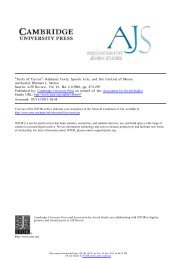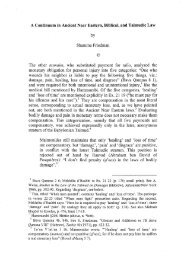Torah in the Mouth.pdf
Torah in the Mouth.pdf
Torah in the Mouth.pdf
Create successful ePaper yourself
Turn your PDF publications into a flip-book with our unique Google optimized e-Paper software.
<strong>Torah</strong> <strong>in</strong> <strong>the</strong> <strong>Mouth</strong>, Writ<strong>in</strong>g and Oral Tradition <strong>in</strong> Palest<strong>in</strong>ian Judaism, 200 BCE - 400 CE<br />
Jaffee, Mart<strong>in</strong> S., Samuel and Al<strong>the</strong>a Stroum Professor of Jewish Studies, University of Wash<strong>in</strong>gton<br />
Pr<strong>in</strong>t publication date: 2001, Published to Oxford Scholarship Onl<strong>in</strong>e: November 2003<br />
Pr<strong>in</strong>t ISBN-13: 978-0-19-514067-5, doi:10.1093/0195140672.001.0001<br />
at S<strong>in</strong>ai. At issue is <strong>the</strong> quantity of oral tradition derived directly from Moses <strong>in</strong> relation to <strong>the</strong> explicit Mosaic writ<strong>in</strong>gs. In Rabbi Leazar's<br />
view (3), <strong>the</strong> ra<strong>the</strong>r small quantity of nonscriptural oral tradition orig<strong>in</strong>at<strong>in</strong>g with Moses is vastly exceeded by oral text-<strong>in</strong>tepretive tradition<br />
stemm<strong>in</strong>g from <strong>the</strong> scriptural exegesis of later Sages. 57 Leazar's unnamed <strong>in</strong>terlocutor (4) disputes this, offer<strong>in</strong>g <strong>the</strong> bold claim that <strong>the</strong><br />
most precious element of <strong>the</strong> oral tradition is <strong>the</strong> portion, however small <strong>in</strong> quantity, that stands free of Scripture. The exegesis of <strong>the</strong><br />
conclud<strong>in</strong>g stich of Hos. 8:12 expla<strong>in</strong>s why <strong>the</strong> oral tradition <strong>in</strong> general, and <strong>the</strong> Mosaic halakhot <strong>in</strong> particular, are so precious (5). In <strong>the</strong><br />
game of religious one-upsmanship, each nation will produce its own historical genealogies to demonstrate its pedigree and<br />
accomplishments. In <strong>the</strong> oral-performative tradition, however, Israel has been given a gift that exempts it from this futile competition over<br />
literary tradition.<br />
This thought is thoroughly explored at unit 6–7, <strong>in</strong> which <strong>the</strong> wordplay grounded <strong>in</strong> <strong>the</strong> language of Ex. 24:27 plays <strong>the</strong> crucial role. The<br />
covenantal status of Israel is l<strong>in</strong>ked firmly not to <strong>the</strong> Scriptures that record <strong>the</strong> covenant agreement, but ra<strong>the</strong>r to <strong>the</strong> oral-performative<br />
tradition of <strong>the</strong> Sages that determ<strong>in</strong>es <strong>the</strong> application of <strong>the</strong> Scripture. The corpus of halakhic tradition has now replaced <strong>the</strong> tablets of<br />
S<strong>in</strong>ai as <strong>the</strong> symbolic representation of Israel's possession of div<strong>in</strong>e love. While <strong>the</strong> oral tradition is, <strong>the</strong>refore, more precious (6), both <strong>the</strong><br />
written and oral revelations are necessary (7).<br />
The forego<strong>in</strong>g sets <strong>the</strong> stage for <strong>the</strong> exposition of Rabbi Yehoshua b. Levi (8–9). Even though he is <strong>the</strong> earliest figure mentioned here, <strong>the</strong><br />
tradition attributed to him stands as a k<strong>in</strong>d of summary of <strong>the</strong> implications of what has gone before. Ignor<strong>in</strong>g <strong>the</strong> more cautious<br />
perspectives of units 1–2 and 3–6, he offers <strong>the</strong> boldest claim about <strong>the</strong> nature of <strong>the</strong> oral tradition preserved among contemporary<br />
rabb<strong>in</strong>ic Sages. Whatever <strong>in</strong>sights dawn <strong>in</strong> <strong>the</strong> m<strong>in</strong>d of a properly tra<strong>in</strong>ed disciple are all an unfold<strong>in</strong>g of <strong>the</strong> orig<strong>in</strong>al oral disclosure to<br />
Moses. The most recent disciple, <strong>the</strong>refore, transmits <strong>in</strong> his mouth knowledge given by God to Moses at <strong>the</strong> very moment of <strong>the</strong><br />
covenant's seal<strong>in</strong>g. The guarantee of this is <strong>the</strong> disciple's own place <strong>in</strong> <strong>the</strong> l<strong>in</strong>e of tradition that extends, beh<strong>in</strong>d his own master, back to<br />
his master's master, and ultimately back to Moses himself.<br />
This passage is like a stone thrown <strong>in</strong>to <strong>the</strong> pool of Galilean Amoraic tradition, send<strong>in</strong>g textual ripples out <strong>in</strong> a variety of directions,<br />
reach<strong>in</strong>g ultimately <strong>the</strong> Amoraic circles of Babylonia. 58 But for <strong>the</strong> present it will be helpful to trace <strong>the</strong> impact of its arguments and<br />
language on o<strong>the</strong>r textual traditions that circulated <strong>in</strong> <strong>the</strong> Galilean environment. A <strong>the</strong>me of only marg<strong>in</strong>al importance <strong>in</strong> <strong>the</strong> cited text—<strong>the</strong><br />
oral tradition as a pr<strong>in</strong>ciple of dist<strong>in</strong>ction between Israel and <strong>the</strong> Gentiles (unit 5)—gradually moved <strong>in</strong>to prom<strong>in</strong>ence as, under Byzant<strong>in</strong>e<br />
rule, <strong>the</strong> Christianization of <strong>the</strong> Land of Israel proceeded apace. By <strong>the</strong> close of <strong>the</strong> sixth century, <strong>the</strong> unwritten character of rabb<strong>in</strong>ic<br />
tradition figured as a standard <strong>the</strong>me <strong>in</strong> rabb<strong>in</strong>ic polemics defend<strong>in</strong>g <strong>the</strong> authority of rabb<strong>in</strong>ic teach<strong>in</strong>gs aga<strong>in</strong>st Christian <strong>the</strong>ological critics.<br />
One text <strong>in</strong> particular carries with<strong>in</strong> it loud echoes of <strong>the</strong> words just reviewed com<strong>in</strong>g from <strong>the</strong> Galilean Amoraim <strong>in</strong> <strong>the</strong> circle of Rabbi<br />
Yohanan. It is preserved <strong>in</strong> a Palest<strong>in</strong>ian homiletic collection of <strong>the</strong> late Byzant<strong>in</strong>e period known as <strong>the</strong> Midrash of Rabbi Tanhuma (Ki<br />
Tissa 17): 59<br />
end p.144<br />
1. As for what Scripture says: “Shall I write for him <strong>the</strong> greater portion of my <strong>Torah</strong>?” (Hos. 8:12)—when <strong>the</strong> Blessed Holy One came to<br />
give <strong>the</strong> <strong>Torah</strong>, he spoke it to Moshe <strong>in</strong> a sequence: first <strong>the</strong> Scripture, <strong>the</strong>n <strong>the</strong> Repeated Tradition (hmšnh), <strong>the</strong>n Homiletics (h'gdh),<br />
and <strong>the</strong>n Dialectics (htlmwd ), for it is said: “And God spoke all <strong>the</strong>se th<strong>in</strong>gs” (Ex. 21:1). [Thus,] even what a tra<strong>in</strong>ed disciple might ask<br />
from his Master <strong>the</strong> Blessed Holy One spoke to Moshe at that moment, for it is said: “And God spoke all <strong>the</strong>se th<strong>in</strong>gs.”<br />
2. When Moshe had mastered it all, <strong>the</strong> Blessed Holy One said to him: Go and teach it to My children!<br />
Said Moshe: Lord of <strong>the</strong> World, write it for Your children.<br />
He replied: I'd like to give it to <strong>the</strong>m <strong>in</strong> script, but I know that one day <strong>the</strong> Nations of <strong>the</strong> World will subdue <strong>the</strong>m and seek to take it<br />
from <strong>the</strong>m, so that my sons will become like <strong>the</strong> o<strong>the</strong>r Nations. Ra<strong>the</strong>r: Let <strong>the</strong>m have <strong>the</strong> Scriptures <strong>in</strong> writ<strong>in</strong>g. But <strong>the</strong> Repeated<br />
Tradition, Homiletics, and Dialectics shall rema<strong>in</strong> <strong>in</strong> <strong>the</strong> mouth.<br />
3. “And <strong>the</strong> Lord said to Moshe: write for Yourself” (Ex. 34:27)—this refers to Scripture.<br />
“But <strong>the</strong>se are oral” (Ex. 34:27)—this refers to <strong>the</strong> Repeated Tradition and Dialectics, for <strong>the</strong>se dist<strong>in</strong>guish between Israel and <strong>the</strong><br />
Nations of <strong>the</strong> World.<br />
This smooth composition displays a number of <strong>in</strong>tertextual connections to Y. Peah 2:6 and its Yerushalmi parallels. Note first, at unit 1,<br />
<strong>the</strong> assumption, shared with Y. Peah (unit 3–5), that Hos. 8:12 conceals a reference to <strong>the</strong> orally transmitted rabb<strong>in</strong>ic tradition of learn<strong>in</strong>g.<br />
The tradent of <strong>the</strong> current passage, however, has now brought Rabbi Yehoshua b. Levi's statement about <strong>the</strong> seasoned disciple (Y. Peah,<br />
unit 8) <strong>in</strong>to closer relationship to <strong>the</strong> Hosea passage. Tanhuma unit 2, for its part, picks up and enriches Y. Peah unit 5’s note of<br />
competition between Israel and <strong>the</strong> Gentiles over <strong>the</strong> possession of written records. But now an entirely fresh issue has <strong>in</strong>truded <strong>in</strong>to <strong>the</strong><br />
discussion: at stake, it turns out, is <strong>the</strong> Gentile claim to possess <strong>the</strong> Scriptures of Israel. The po<strong>in</strong>t is driven home at unit 3, which<br />
restates <strong>in</strong> a fresh way <strong>the</strong> exegesis of Ex. 34:27 that figures so crucially <strong>in</strong> Y. Peah unit 6. Whereas <strong>the</strong> tradent of Y. Peah was<br />
concerned only to celebrate <strong>the</strong> covenantal preciousness of <strong>the</strong> oral tradition, Tanhuma's composer specifies that <strong>the</strong> covenantal<br />
PRINTED FROM OXFORD SCHOLARSHIP ONLINE (www.oxfordscholarship.com). (c) Copyright Oxford University Press, 2003 - 2011. All Rights Reserved.<br />
Under <strong>the</strong> terms of <strong>the</strong> licence agreement, an <strong>in</strong>dividual user may pr<strong>in</strong>t out a PDF of a s<strong>in</strong>gle chapter of a monograph <strong>in</strong> OSO for personal use (for details<br />
see http://www.oxfordscholarship.com/oso/public/privacy_policy.html).<br />
Subscriber: Columbia University; date: 20 September 2011

















